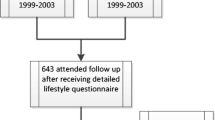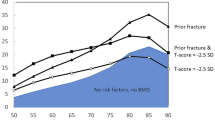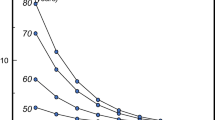Abstract
Summary
Genetic risk of low BMD in African American women remains unclear. Based on SNPs discovered from a predominantly Caucasian sample, genetic profile was summarized and was found to be significantly associated with BMD variation in African American women.
Introduction
Osteoporosis is largely under-recognized and undertreated in African-American women, the post-fracture morbidity and mortality rates in this racial group is rather high. Since BMD was proved to be highly heritable, based on a comprehensive genome-wide meta-analysis that reported 63 BMD-related single nucleotide polymorphisms (SNPs), we aim to unravel the overall genetic risk for decreased BMD and osteoporosis in African-American women.
Methods
Genotype data of 842 African American women in a Women’s Health Initiative cohort were analyzed. Comprehensive genotype imputation was conducted at the Sanger Imputation Server. Multi-locus genetic risk scores (GRSs) based on 62 BMD-related single-nucleotide polymorphisms (SNPs) were calculated. The association between GRS and BMD was assessed by regression analysis. Longitudinal data was further analyzed using a generalized estimating equation, which helps achieve more efficient and unbiased regression parameters by accounting for the within-subject correlation of responses on dependent variables.
Results
After adjusting for age, body weight, hormone use, and previous fracture, for every unit increase of GRS.FN and GRS.LS, BMD at hip and lumbar spine decreased 0.124 g/cm2 and 0.086 g/cm2, respectively. Collectively, the model accounted for 34.95% of the femoral neck BMD variation and 25.79% of lumbar spine BMD variation. Notably, GRS.FN and GRS.LS accounted for 2.03% and 2.39% of the total explained variance, respectively. The proportion of BMD variation can be explained by GRSs increasing as participants aged.
Conclusions
Genetic risk score was significantly associated with lower BMD in the current study, suggesting that SNPs discovered from prior meta-analysis based on primarily Caucasian population can also explain a considerable proportion of BMD variation in African Americans.
Similar content being viewed by others
Data availability
The data/analyses presented in the current publication are based on the use of study data downloaded from the dbGaP web site, under phs000746 (https://www.ncbi.nlm.nih.gov/projects/gap/cgi-bin/study.cgi?study_id=phs000746.v2.p3).
Abbreviations
- GRS:
-
Genetic risk score
- BMD:
-
Bone mineral density
- SNP:
-
Single-nucleotide polymorphism
- GWAS:
-
Genome-wide association study
- dbGaP:
-
The database of Genotypes and Phenotypes
- WHI:
-
Women’s Health Initiative
- WHI-SHARe:
-
Women’s Health Initiative – SNP Health Association Resource
References
Sözen T, Özışık L, Başaran NÇ (2017) An overview and management of osteoporosis. Eur J Rheumatol 4:46–56
Cauley JA (2013) Public health impact of osteoporosis. J Gerontol A Biol Sci Med Sci 68:1243–1251
Cauley JA (2011) Defining ethnic and racial differences in osteoporosis and fragility fractures. Clin Orthop Relat Res 469:1891–1899
Burge R, Dawson-Hughes B, Solomon DH, Wong JB, King A, Tosteson A (2007) Incidence and economic burden of osteoporosis-related fractures in the United States, 2005-2025. J Bone Miner Res 22:465–475
Aloia JF, Vaswani A, Yeh JK, Flaster E (1996) Risk for osteoporosis in black women. Calcif Tissue Int 59:415–423
Hochberg MC (2007) Racial differences in bone strength. Trans Am Clin Climatol Assoc 118:305–315
Baron JA, Karagas M, Barrett J, Kniffin W, Malenka D, Mayor M, Keller RB (1996) Basic epidemiology of fractures of the upper and lower limb among Americans over 65 years of age. Epidemiology (Cambridge, Mass) 7:612–618
Wright NC, Looker AC, Saag KG, Curtis JR, Delzell ES, Randall S, Dawson-Hughes B (2014) The recent prevalence of osteoporosis and low bone mass in the United States based on bone mineral density at the femoral neck or lumbar spine. J Bone Miner Res 29:2520–2526
Farmer ME, White LR, Brody JA, Bailey KR (1984) Race and sex differences in hip fracture incidence. Am J Public Health 74:1374–1380
Baron JA, Barrett J, Malenka D, Fisher E, Kniffin W, Bubolz T, Tosteson T (1994) Racial differences in fracture risk. Epidemiology (Cambridge, Mass) 5:42–47
(December 1999) Osteoporosis and Related Bone Diseases-- National Resource center Web site.
Bohannon AD (1999) Osteoporosis and African American women. J Womens Health Gend Based Med 8:609–615
Geller SE, Derman R (2001) Knowledge, beliefs, and risk factors for osteoporosis among African-American and Hispanic women. J Natl Med Assoc 93:13–21
Sadler C, Huff M (2007) African-American women: health beliefs, lifestyle, and osteoporosis. Orthop Nurs 26:96–101 quiz 102-3
Bronner YL, Hawkins AS, Holt ML, Hossain MB, Rowel RH, Sydnor KL, Divers SP (2006) Models for nutrition education to increase consumption of calcium and dairy products among African Americans. J Nutr 136:1103–1106
Miller RG, Ashar BH, Cohen J, Camp M, Coombs C, Johnson E, Schneyer CR (2005) Disparities in osteoporosis screening between at-risk African-American and white women. J Gen Intern Med 20:847–851
Cheng H, Gary LC, Curtis JR, Saag KG, Kilgore ML, Morrisey MA, Matthews R, Smith W, Yun H, Delzell E (2009) Estimated prevalence and patterns of presumed osteoporosis among older Americans based on Medicare data. Osteoporos Int 20:1507–1515
Kellie SE, Brody JA (1990) Sex-specific and race-specific hip fracture rates. Am J Public Health 80:326–328
Kanis JA (1994) Assessment of fracture risk and its application to screening for postmenopausal osteoporosis: synopsis of a WHO report. WHO Study Group, Osteoporos Int 4:368–381
Stewart TL, Ralston SH (2000) Role of genetic factors in the pathogenesis of osteoporosis. J Endocrinol 166:235–245
Arden NK, Spector TD (1997) Genetic influences on muscle strength, lean body mass, and bone mineral density: a twin study. J Bone Miner Res 12:2076–2081
Michaelsson K, Melhus H, Ferm H, Ahlbom A, Pedersen NL (2005) Genetic liability to fractures in the elderly. Arch Intern Med 165:1825–1830
Richards JB, Zheng HF, Spector TD (2012) Genetics of osteoporosis from genome-wide association studies: advances and challenges. Nat Rev Genet 13:576–588
Liu Y-J, Zhang L, Papasian CJ, Deng H-W (2014) Genome-wide association studies for osteoporosis: a 2013 update. J Bone Metab 21:99–116
Estrada K, Styrkarsdottir U, Evangelou E, Hsu YH, Duncan EL, Ntzani EE, Oei L, Albagha OM, Amin N, Kemp JP, Koller DL, Li G, Liu CT, Minster RL, Moayyeri A, Vandenput L, Willner D, Xiao SM, Yerges-Armstrong LM, Zheng HF, Alonso N, Eriksson J, Kammerer CM, Kaptoge SK, Leo PJ, Thorleifsson G, Wilson SG, Wilson JF, Aalto V, Alen M, Aragaki AK, Aspelund T, Center JR, Dailiana Z, Duggan DJ, Garcia M, Garcia-Giralt N, Giroux S, Hallmans G, Hocking LJ, Husted LB, Jameson KA, Khusainova R, Kim GS, Kooperberg C, Koromila T, Kruk M, Laaksonen M, Lacroix AZ, Lee SH, Leung PC, Lewis JR, Masi L, Mencej-Bedrac S, Nguyen TV, Nogues X, Patel MS, Prezelj J, Rose LM, Scollen S, Siggeirsdottir K, Smith AV, Svensson O, Trompet S, Trummer O, van Schoor NM, Woo J, Zhu K, Balcells S, Brandi ML, Buckley BM, Cheng S, Christiansen C, Cooper C, Dedoussis G, Ford I, Frost M, Goltzman D, Gonzalez-Macias J, Kahonen M, Karlsson M, Khusnutdinova E, Koh JM, Kollia P, Langdahl BL, Leslie WD, Lips P, Ljunggren O, Lorenc RS, Marc J, Mellstrom D, Obermayer-Pietsch B, Olmos JM, Pettersson-Kymmer U, Reid DM, Riancho JA, Ridker PM, Rousseau F, Slagboom PE, Tang NL et al (2012) Genome-wide meta-analysis identifies 56 bone mineral density loci and reveals 14 loci associated with risk of fracture. Nat Genet 44:491–501
Xiao X, Roohani D, Wu Q (2018) Genetic profiling of decreased bone mineral density in an independent sample of Caucasian women. Osteoporos Int 29:1807–1814
Alam NM, Archer JA, Lee E (2004) Osteoporotic fragility fractures in African Americans: under-recognized and undertreated. J Natl Med Assoc 96:1640–1645
Berger C, Langsetmo L, Joseph L, Hanley DA, Davison KS, Josse RG, Prior JC, Kreiger N, Tenenhouse A, Goltzman D (2009) Association between change in BMD and fragility fracture in women and men. J Bone Miner Res 24:361–370
Nguyen TV, Center JR, Eisman JA (2005) Femoral neck bone loss predicts fracture risk independent of baseline BMD. J Bone Miner Res 20:1195–1201
Ahmed LA, Emaus N, Berntsen GK, Bjornerem A, Fonnebo V, Jorgensen L, Schirmer H, Stormer J, Joakimsen RM (2010) Bone loss and the risk of non-vertebral fractures in women and men: the Tromso study. Osteoporos Int 21:1503–1511
Makovey J, Nguyen TV, Naganathan V, Wark JD, Sambrook PN (2007) Genetic Effects on bone loss in peri- and postmenopausal women: a longitudinal twin study. J Bone Miner Res 22:1773–1780
Shaffer JR, Kammerer CM, Bruder JM, Cole SA, Dyer TD, Almasy L, MacCluer JW, Blangero J, Bauer RL, Mitchell BD (2008) Genetic influences on bone loss in the San Antonio Family Osteoporosis study. Osteoporos Int 19:1759–1767
Zhai G, Andrew T, Kato BS, Blake GM, Spector TD (2009) Genetic and environmental determinants on bone loss in postmenopausal Caucasian women: a 14-year longitudinal twin study. Osteoporos Int 20:949–953
(1998) Design of the Women’s Health Initiative clinical trial and observational study, Control Clin Trials.19, 61-109.
Osteoporosis, W. S. G. o. t. P. a. M. o. (2003) Prevention and management of osteoporosis: report of a WHO scientific group. in
Li Y, Willer CJ, Ding J, Scheet P, Abecasis GR (2010) MaCH: using sequence and genotype data to estimate haplotypes and unobserved genotypes. Genet Epidemiol 34:816–834
Kruskal W (1987) Relative importance by averaging over orderings. Am Stat 41:6–10
Grömping U (2007) Estimators of relative importance in linear regression based on variance decomposition. Am Stat 61:139–147
Scheppers E, van Dongen E, Dekker J, Geertzen J, Dekker J (2006) Potential barriers to the use of health services among ethnic minorities: a review. Fam Pract 23:325–348
Liang K-Y, Zeger SL (1986) Longitudinal data analysis using generalized linear models. Biometrika. 73:13–22
Zeger SL, Liang K-Y (1986) Longitudinal data analysis for discrete and continuous outcomes. Biometrics. 42:121–130
Warming L, Hassager C, Christiansen C (2002) Changes in bone mineral density with age in men and women: a longitudinal study. Osteoporos Int 13:105–112
Arlot ME, Sornay-Rendu E, Garnero P, Vey-Marty B, Delmas PD (1997) Apparent pre- and postmenopausal bone loss evaluated by DXA at different skeletal sites in women: the OFELY cohort. J Bone Miner Res 12:683–690
Reeve J, Walton J, Russell LJ, Lunt M, Wolman R, Abraham R, Justice J, Nicholls A, Wardley-Smith B, Green JR, Mitchell A (1999) Determinants of the first decade of bone loss after menopause at spine, hip and radius. QJM 92:261–273
Eriksson J, Evans DS, Nielson CM, Shen J, Srikanth P, Hochberg M, McWeeney S, Cawthon PM, Wilmot B, Zmuda J, Tranah G, Mirel DB, Challa S, Mooney M, Crenshaw A, Karlsson M, Mellström D, Vandenput L, Orwoll E, Ohlsson C (2015) Limited clinical utility of a genetic risk score for the prediction of fracture risk in elderly subjects. J Bone Miner Res 30:184–194
Ho-Le TP, Pham HM, Center JR, Eisman JA, Nguyen HT, Nguyen TV (2018) Prediction of changes in bone mineral density in the elderly: contribution of “osteogenomic profile”. Arch Osteoporos 13:68
Luckey MM, Meier DE, Mandeli JP, DaCosta MC, Hubbard ML, Goldsmith SJ (1989) Radial and vertebral bone density in white and black women: evidence for racial differences in premenopausal bone homeostasis. J Clin Endocrinol Metab 69:762–770
Cauley JA, Lui LY, Stone KL, Hillier TA, Zmuda JM, Hochberg M, Beck TJ, Ensrud KE (2005) Longitudinal study of changes in hip bone mineral density in Caucasian and African-American women. J Am Geriatr Soc 53:183–189
Chen Z, Qi L, Beck TJ, Robbins J, Wu G, Lewis CE, Cauley JA, Wright NC, Seldin MF (2011) Stronger bone correlates with African admixture in African-American women. J Bone Miner Res 26:2307–2316
Finkelstein JS, Brockwell SE, Mehta V, Greendale GA, Sowers MR, Ettinger B, Lo JC, Johnston JM, Cauley JA, Danielson ME, Neer RM (2008) Bone mineral density changes during the menopause transition in a multiethnic cohort of women. J Clin Endocrinol Metab 93:861–868
Luckey MM, Wallenstein S, Lapinski R, Meier DE (1996) A prospective study of bone loss in African-American and white women--a clinical research center study. J Clin Endocrinol Metab 81:2948–2956
Tracy JK, Meyer WA, Flores RH, Wilson PD, Hochberg MC (2005) Racial differences in rate of decline in bone mass in older men: the Baltimore men's osteoporosis study. J Bone Miner Res 20:1228–1234
Heaney RP (2006) Low calcium intake among African Americans: effects on bones and body weight. J Nutr 136:1095–1098
(June 2015) Osteoporosis and African American Women in NIH Osteoporosis and Related Bone Diseases, National Resource Center,
James, G. W., Daniela; Hastie, Trevor; Tibshirani, Robbert (2017) An introduction to statistical learning Springer Science + Business Media New York.
Funding
The research and analysis described in the current publication was supported by a grant from the National Institute of General Medical Sciences (GR08954), the Genome Acquisition to Analytics (GAA) Research Core of the Personalized Medicine Center of Biomedical Research Excellence in the Nevada Institute of Personalized Medicine, and the National Supercomputing Institute at the University of Nevada Las Vegas.
Author information
Authors and Affiliations
Corresponding author
Ethics declarations
Conflicts of interest
None.
Disclaimer
The funding sponsor was not involved in the analysis design, genotype imputation, data analysis, and interpretation of the analysis results or the preparation, review, and approval of this manuscript.
Additional information
Publisher’s note
Springer Nature remains neutral with regard to jurisdictional claims in published maps and institutional affiliations.
Electronic supplementary material
ESM 1
(DOCX 457 kb)
Rights and permissions
About this article
Cite this article
Xiao, X., Wu, Q. Association between a literature-based genetic risk score and bone mineral density of African American women in Women Health Initiative Study. Osteoporos Int 31, 913–920 (2020). https://doi.org/10.1007/s00198-019-05244-8
Received:
Accepted:
Published:
Issue Date:
DOI: https://doi.org/10.1007/s00198-019-05244-8




